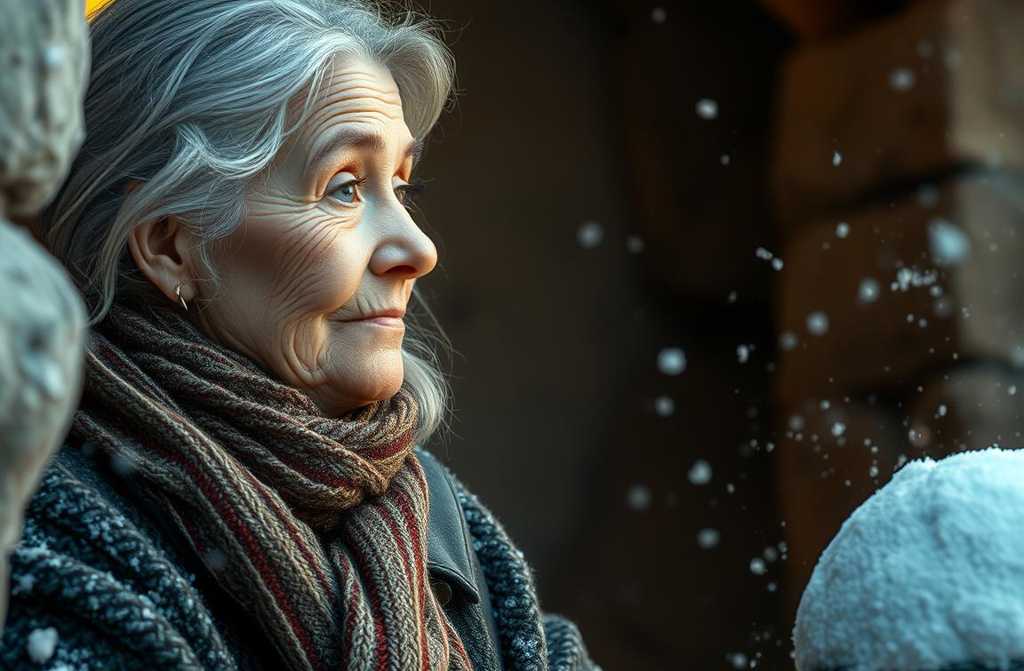In the village, they said old Martha had lost her wits with age. Many avoided her cottage, whispering she was a witch, but to this day, they still remember how she silenced the gossips…
To look at her, Martha was just another elderly countrywomana bit odd, perhaps, but kind-hearted. She helped those in need, though her pension was meagre, and never turned away lost travellers. The wealthier villagers (for it was a prosperous place) rarely let strangers cross their thresholdsmight offer a ladle of water from the well, but never a bed for the night.
Martha was differentshed feed any wanderer, set a humble meal before them, and give them a place to sleep if dusk had fallen. For this, they called her strange. “Letting outsiders in,” they muttered, “with a marriageable girl in the house.” Some even threatened her:
“Keep this up, and well have young Mary sent to the orphanage. Well call the welfare, and theyll take your granddaughter.”
But that was long ago. Once Mary came of age, the spiteful tongues fell silent. Still, Martha had seethed with anger back thenMary was her hearts blood, her one treasure, her hope for old age.
She was all Martha had left. All her kin were goneher husband taken young by a heart attack at forty-two. Shed raised her daughter, sweet little Ellen, alone. Ellen had married well, moved to the city, and borne Mary. Then came the tragedy…
Ellens husband was a geologist, always away on expeditionssometimes six months would pass without him coming home. Then, from one journey, he never returnedvanished without a trace, not even a body found. Search parties went out, and even one of the rescuers disappearedor so Ellen was told.
She grieved terribly, left with a small child and no husband. Martha held her firm through those dark days.
“I raised you alone after your father passed,” shed say, “and youll do the sameraise Mary, and Ill help.”
At first, Ellen seemed to find peace, accepting her heavy fate. But in truth, she only wore a mask to spare her mothers heart. And two years later, the unthinkable happened.
Ellen took to drowning her sorrowsfirst in sips, then in gulps.
“The worlds lost all colour without my dear Edward,” shed weep. “Ill never see my beloved again, never know happiness. Whats left to live for?”
Martha tried everythingbut in the end, Ellen bound her life to the bottle, and died in her prime. The village judged her harshly, but perhaps it was simply her fate.
Fifteen-year-old Mary was left an orphan. Martha took her in, brought her to the village. Mary resisted at firstshe was used to city lifebut Martha persuaded her.
“On my pension, wed starve in town. Here, weve a garden, chickens…”
And shed often say:
“Youll have a different life, my treasurejust you wait. When youre older, Ill find you a fine husband!”
“Wherell you find him, Gran? In this backwater? Only lost travellers ever pass through.”
“Leave that to me, dear. Let spiteful tongues wagpay them no mind.”
So they lived, the two of them, in a tumbledown cottage on the village edge. Martha kept house; Mary went to the village school, helped with chores after.
Her classmates mocked herthey knew her mothers fate. The neighbours loved to gossip:
“Her mother was a drunkwhat good can come of the girl?”
It stung Martha to hear itnone of it was Marys fault. But she swore thenshed see her granddaughters future secured.
She stopped heeding the neighbours altogetherlet them chatter. They hated her for itas if their words meant nothing.
But now and then, they still couldnt resist. If Martha took in some traveller, the whispers spread”Shes picking a husband for Mary among the drifters. No decent lad here would wed her, not with that past.”
“As if wed want your louts,” Martha would retort. “Marys meant for better.”
“Well see about that,” theyd sneer, calling her “witch” behind her back.
Time passed. The village quietedthe cruel words grew fewer. It seemed theyd been left in peacebut it was just the calm before the storm, which broke over nothing. Yet that storm marked the turning point in the old womans fateand her orphaned granddaughters.
One still winters evening, when the village was near-dark, noises rose beyond the fencea stalled engine, men cursing the weather, the roads, their rotten luck.
A burly neighbour stormed out, furious at the disturbance.
“Whats all this racket at night? Folk are trying to sleep!”
“Night? Its barely eight!”
“Who are you, anyway? City folk, by the looks. What brings you to this godforsaken place?”
“Were hunters. Got lost on the way to the winter chase. Now the motors dead. Any chance you could help?”
“And what if youre not who you say? We dont take strangers innot with two daughters in my house. Cant help with the motorno skill for it. Youre on your own.”
The hunters exchanged glances.
“Well, thanks all the same. Anywhere here we might stay the night?”
“No innsthis aint the city,” the villager snapped, turning to leave. Then, as an afterthought, he jerked a thumb toward the village edge.
“Theres one old hag wholl take you in. Half-mad, but shell open her door. Got a girl living with herwont be dull for you.”
The door slammed behind him. The hunters, seeing no choice, trudged through the dark to the cottage.
“Housekeeper! Sorry for the late callmight we warm ourselves?”
“Of course, of course! Come in, ladsteas brewing.” The door creaked wide. Martha stood there, quick as ever. “Where you from, then? What brings you our way?”
“Hunters,” they mumbled, startled by her welcome.
“Im Oliver, and this is my oldest friend, Will,” said the taller one. Will flushed like a maiden.
“No need to fret, boys. Folk here call me mad, but youll be warm enough. Suppers soontoo early for bed yet.”
They ate heartilyboiled potatoes, pickles, fresh bread that smelled like childhood.
“Just like my grans,” Will murmured.
“Eat up, lads. Ill fetch the samovartea with dandelion jam. Youll not taste its like elsewhere!”
“Dandelions?” Oliver blinked.
“My gran made that too,” Will said, and Martha warmed to him.
From the next room came a faint voice:
“Gran water”
The men glanced at the photos on the silla young couple, likely Marthas daughter and son-in-law, and beside them, a girl with sad eyes.
“Your granddaughter? Is she ill?”
“Fool childchopped wood yesterday, took fever by night. No medicine here, and Im too old to fetch any.”
“Hereweve fever pills.” Will rummaged in his pack.
Martha took them, grateful.
At dawn, Will rose early, found the axe, and split kindling.
“Fine work, lad!” Martha beamed. “Been years since a mans hand helped here.”
Will shrugged. “Habitdid the same for my gran.”
She smiled. “Stay for the feastShrovetides near.”
Oliver refused flatly. “Not staying in this hole. You do as you like.”
They argued heatedlyso loudly the neighbour heard, and soon returned with a mechanic.
“Fancy motor youve got,” the neighbour muttered to Will aside. “Cost a fortune, Ill wager. My advice? Steer clear of that mad crone and her girl. Paupers, the lot. If youre after a village bride (city men fancy that these days), Ive two daughtersbetter stock.”
Will understood thenthe man had heard him called a restaurant owner and hoped to wed a daughter to wealth. He smiled politely.
“Perhaps at Shrovetide.”
At breakfast, Mary joined thempale but better. Will couldnt take his eyes off her.
“Gran Martha,” he ventured, “might I take Mary to town?”
“If she wishes itwhen shes well.”
Oliver left in a huff, but Will lingered, promising to return.
Two days later, on Shrovetide, the neighbour crowed:
“Your fine guests not coming! He owns a grand restaurant in townwhatd he want with you?”
Mary fled inside. Martha glared. “Dont gloat too soon.”
Thena car rounded the bend. Will stepped out, arms full of roses.
“Gran Martha,” he said, “Ive lost my heart to your Mary. May I have her?”
Mary flew to him. The neighbour gaped.
And the village whispered for years afterhow the mad old witch had enchanted a wealthy man, spun fortune for her girl. But Martha only smiled, knowing some blessings need no magic.







